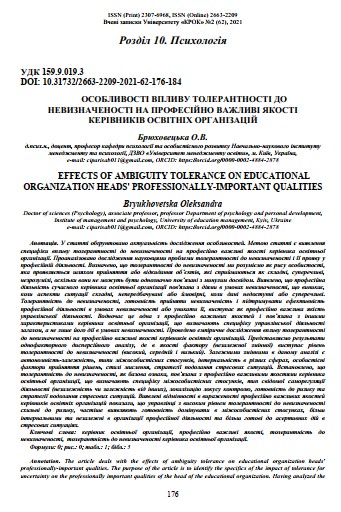ОСОБЛИВОСТІ ВПЛИВУ ТОЛЕРАНТНОСТІ ДО НЕВИЗНАЧЕНОСТІ НА ПРОФЕСІЙНО ВАЖЛИВІ ЯКОСТІ КЕРІВНИКІВ ОСВІТНІХ ОРГАНІЗАЦІЙ
DOI:
https://doi.org/10.31732/2663-2209-2021-62-176-184Ключові слова:
керівник освітньої організації, професійно важливі якості, толерантність до невизначеності, толерантність до невизначеності керівника освітньої організаціїАнотація
У статті обґрунтовано актуальність дослідження особливостей. Метою статті є виявлення специфіки впливу толерантності до невизначеності на професійно важливі якості керівника освітньої організації. Проаналізовано дослідження науковцями проблеми толерантності до невизначеності і її прояву у професійній діяльності. Визначено, що толерантності до невизначеності ми розуміємо як рису особистості, яка проявляється шляхом прийняття або відкидання об’єктів, які сприймаються як складні, суперечливі, незрозумілі, оскільки вони не можуть бути однозначно пов’язані з минулим досвідом. Виявлено, що професійна діяльність сучасного керівника освітньої організації пов'язана з діями в умовах невизначеності, що виникає, коли аспекти ситуації складні, непередбачувані або ймовірні, коли дані недоступні або суперечливі. Толерантність до невизначеності, готовність прийняти невизначеність і підтримувати ефективність професійної діяльності в умовах невизначеності або уникати її, виступає як професійно важлива якість управлінської діяльності. Водночас це одна з професійно важливих якостей і пов’язана з іншими характеристиками керівника освітньої організації, що визначають специфіку управлінської діяльності загалом, а не лише його дії в умовах невизначеності. Проведено емпіричне дослідження впливу толерантності до невизначеності на професійно важливі якості керівників освітніх організацій. Представляємо результати однофакторного дисперсійного аналізу, де в якості фактору (незалежної змінної) виступає рівень толерантності до невизначеності (високий, середній і низький). Залежними змінними в даному аналізі є автономність-залежність, типи міжособистісних стосунків, інтернальність в різних сферах, особистісні фактори прийняття рішень, стилі мислення, стратегії подолання стресових ситуацій. Встановлено, що толерантність до невизначеності, як базова ознака, пов’язана з професійно важливими якостями керівника освітньої організації, що визначають специфіку міжособистісних стосунків, тип свідомої саморегуляції діяльності (незалежність чи залежність від інших), локалізацію локусу контролю, готовність до ризику та стратегії подолання стресових ситуацій. Виявлені відмінності в вираженості професійно важливих якостей керівників освітніх організацій показали, що управлінці з високим рівнем толерантності до невизначеності схильні до ризику, частіше виявляють готовність домінувати в міжособистісних стосунках, більш інтернальними та незалежні в організації професійної діяльності та більш готові до асертивних дій в стресових ситуаціях.
Завантаження
Посилання
Брюховецька О. В. Психологічні особливості толерантності до невизначеності в управлінській діяльності керівників загальноосвітніх навчальних закладів. Проблеми сучасної психології. 2015. Вип. 27. С. 71–81.
Бондарчук О. І., Карамушка Л. М., Брюховецька О. В. та ін. Формування психологічної компетентності керівників освітніх організацій в умовах післядипломної педагогічної освіти. Київ : Наук. світ, 2012. 190 с.
Шершньова З. Є. Стратегічне управління : підручник. 2-ге вид., перероб. і доп. Київ: КНЕУ, 2004. 699 с.
Бондарчук О. І., Карамушка Л. М., Брюховецька О. В., Сингаївська І. В. Формування психологічної компетентності керівників освітніх організацій в умовах післядипломної педагогічної освіти: наук.-метод. посіб. Київ: Наук. світ, 2012. 190 с.
Сингаївська І. В. Зростання психологічної компетентності керівника освітньої організації у процесі підвищення кваліфікації. Актуальні проблеми психології. Т. 1: Організаційна психологія. Економічна психологія. Соціальна психологія. 2009. Ч. 24. С. 87–91.

Downloads
Опубліковано
Як цитувати
Номер
Розділ
Ліцензія

Ця робота ліцензується відповідно до Creative Commons Attribution 4.0 International License.

